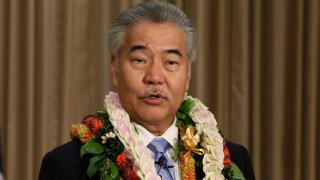
Hawaii's COVID-19 case counts and hospitalizations have declined to the point where the islands are ready to welcome travelers once again, the governor said Tuesday.
Gov. David Ige said vacationers and business travelers are welcome to return to the islands starting Nov. 1.
His announcement comes nearly two months after he asked travelers on Aug. 23 to avoid Hawaii because case counts were surging with the spread of the highly transmissible delta variant and hospitals were becoming overwhelmed. The state didn't impose any new travel quarantine restrictions, and Ige's plea was a mere request. Even so, it prompted thousands of travelers to cancel plans to visit Hawaii.
In the intervening months, Hawaii's seven-day average of daily new cases has plummeted from 900 to 117. COVID-19 hospitalizations have dropped from more than 400 to about 100 statewide.
Get Tri-state area news and weather forecasts to your inbox. Sign up for NBC New York newsletters.
“I think we are all encouraged by what we’ve seen over the last several weeks with the continuing trend of lower case counts,” Ige said in a remarks at a ceremony opening a new airport facility in Kailua-Kona. “Our hospitals are doing better, and we have fewer COVID patients in them. Most importantly, our health care system has responded, and we have the ability to move forward with economic recovery."
To avoid a 10-day quarantine upon arrival, travelers must show proof of vaccination or a negative COVID-19 test taken within 72 hours of their departure for Hawaii.
The governor said Hawaii was seeking information from the federal government about its plans to require foreign nationals traveling to the U.S. to show proof of vaccination beginning Nov. 8.
U.S. & World
Hawaiian Airlines, which is one of the state's biggest employers, has said it will be crucial for Hawaii to match its travel policies with federal rules on international travel to avoid confusion and eliminate redundant screening.
Most visitors to Hawaii during the pandemic have come from the other 49 states, in part because countries like Japan still have strict quarantine requirements for those returning to home after traveling abroad.



